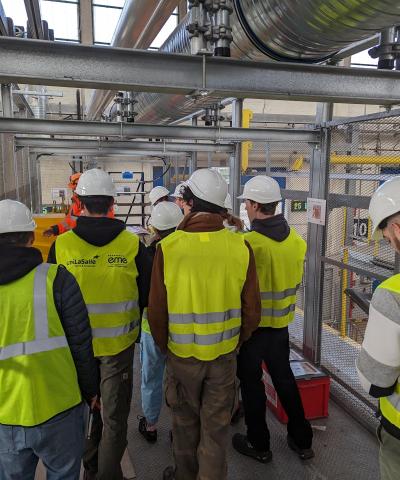
Bachelor's Degree in Environment and Sustainable Development
The environment encompasses the natural and artificial elements that surround living organisms. This includes air, water, soil, flora, fauna and climatic factors.
It is a complex system in which each element plays a crucial role in maintaining the overall balance. Human activities have a considerable impact on this balance and require awareness and the adoption of sustainable practices.
Faced with the growing need to support companies and local authorities in adopting sustainable practices that help maintain a global balance, environmental professions are constantly reinventing themselves and require recognized expertise.
Training in environmental professions has many advantages on a personal, professional and societal level. The sector offers a variety of fields of action and professions.
From Bachelor to Master's degree, UniLaSalle Rennes trains future professionals with diversified and evolving career opportunities.
The UniLaSalle Rennes campus | School of Environmental Professions has been training experts committed to a more sustainable future for over 30 years, thus contributing to the common good and the protection of our environment.
Our courses, which are 100% dedicated to environmental protection, have several objectives in order to prepare students to understand, analyze and act on environmental issues.
Through its educational programs, UniLaSalle Rennes aims to train competent professionals who are aware of environmental issues and capable of contributing to the creation of sustainable solutions to preserve the planet.
Here are some of the common objectives of the bachelor's to advanced master's programs:
The programs aim to provide a thorough understanding of current environmental issues, including climate change, biodiversity, air and water pollution, waste management, and more.
Training courses aim to develop specific technical skills related to the environment, such as data analysis, natural resource management, environmental policy design, understanding and complying with French and European regulations, etc.
Students are encouraged to develop skills for designing and implementing sustainable solutions to environmental challenges in energy, waste management, biodiversity conservation, or other related fields.
Programs systematically include a social and economic dimension to raise students' awareness of the human and economic implications of environmental issues.
The training courses are designed to enhance students' communication skills, as raising public awareness and effectively transmitting information are important aspects of any environmental professional's role.
All our training courses include internships, research projects or work experience through sandwich courses, for example, to provide students with practical, hands-on experience in the environmental field.
Programs generally emphasize professional ethics and social responsibility, encouraging students to act ethically and consider the social impact of their decisions.
In line with the Uni4change strategy, which commits all the Institut Polytechnique UniLaSalle's activities to ecological and societal transformation, all the Institut Polytechnique UniLaSalle's engineering and Bachelor's degree courses develop scientific and technical skills in the environment and sustainable development.